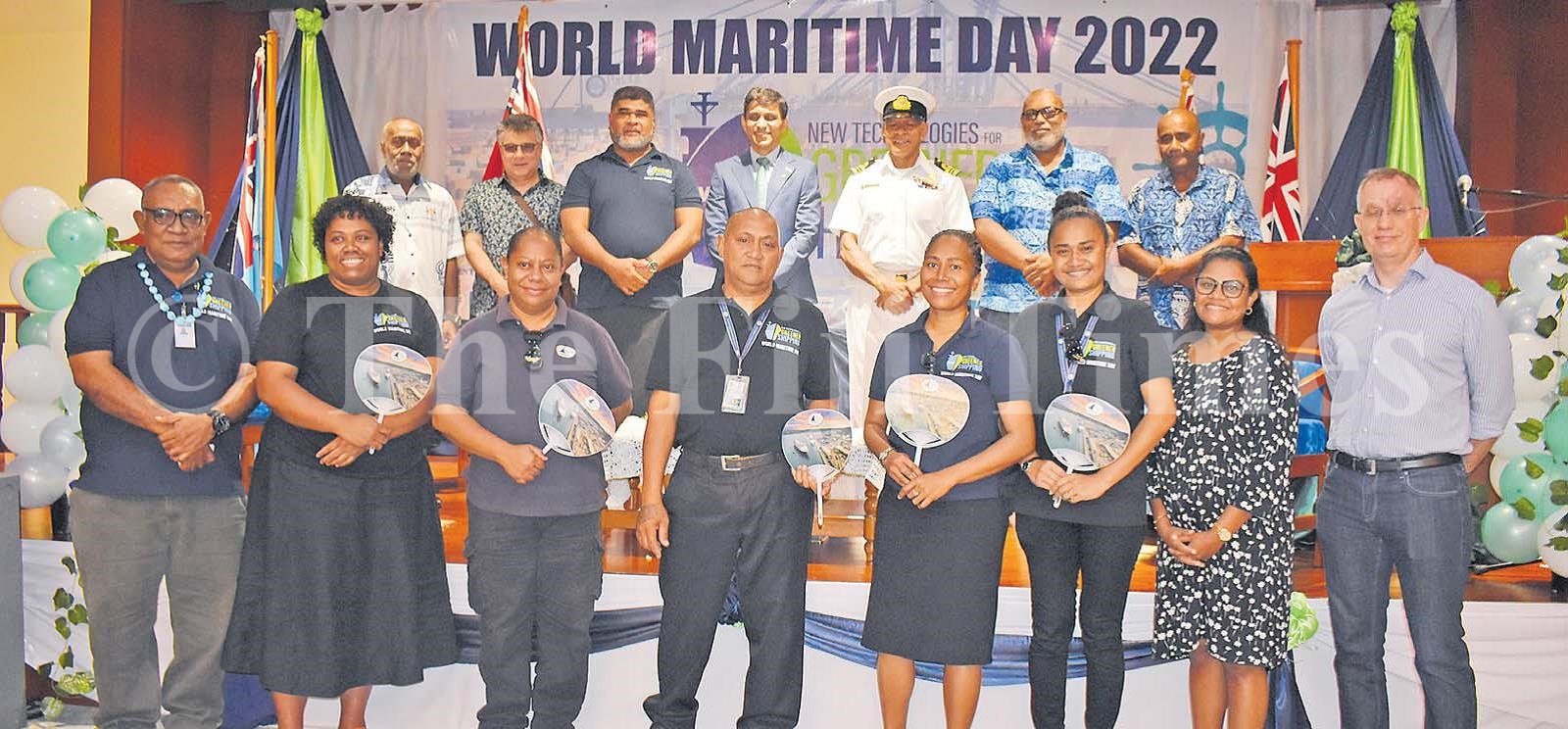Seafarers and maritime workers stood in complete silence at the Suva seawall as a wreath was set afloat to remember colleagues who lost their lives out at sea because of their fidelity to serve the shipping industry.
Hundreds turned up to commemorate World Maritime Day (WMD) on September 29 last week.
From retired seafarers to current maritime workers whose jobs keeps the country afloat with their service to trade and sea transportation.
The day was solely dedicated to honouring the tireless efforts of maritime workers behind the scenes operating, controlling and servicing Fiji, the region and international waters.
With the theme ‘New Technologies for Greener Shipping’ maritime stakeholders, partners, government officials, navy representatives, private sector representatives, shipping companies and students had the chance to celebrate the commitment that the industry has towards going green.
Guests had the opportunity to learn about the steps the industry would take to tackle shipping emission even though Fiji only contributes 0.006 per cent to global emissions.
Global shipping emissions are responsible for roughly three per cent of the world’s greenhouse gas (GHG) emissions which today continues to grow.
The World Maritime Day was a good avenue for younger generations who are interested to join the maritime industry to capture the essence of shipping and the importance of reducing emission. Playing a crucial role in the reduction of GHG emission around the world is the International Maritime Organization — the specialised agency of the United Nations responsible for regulating shipping around the world.
IMO secretary-general Kitack Lim in his message said throughout this year, the organisation highlighted ‘green shipping’ solutions across the industry and provided a platform for sharing knowledge and best practices.
“IMO will also foster a dialogue on innovation and technology needs for greener shipping — and sharing knowledge at a global level,” Mr Lim said.
He said IMO was to provide updates on initiatives that are on trial and piloted by the IMO established Maritime Technology Cooperation Centres (MTCC), the Green- Voyage2050 decarbonisation project and the Blue Solution Project.
“These will demonstrate new maritime decarbonisation technologies and build on our NextGen decarbonisation initiative, which links efforts of existing IMO projects, MTCC’s and various research and development centres to enhance knowledgesharing at the global level,” he said.
Ministry of Transport, permanent secretary Shaheen Ali during the event said in an effort to address the impacts of climate change on Small Island Developing States (SIDS), the IMO adopted an initial strategy on the reduction of GHG emissions from ships with a vision aimed to phase them out as soon as possible in this century.
He said the strategy envisages a reduction in carbon intensity in international shipping and sets a pathway of CO2 emissions reduction, consistent with the Paris Agreement.
“We have made a global commitment of net-zero carbon emissions by 2050, under the Paris Agreement,” he said.
“Nationally, we have legislated this commitment through the Climate Change Act 2021. We have also pledged to reduce our shipping emissions by 40 per cent by 2030.”
He said to illustrate the partnership, Fiji is working closely with the Global Maritime Technology Cooperation Centre (MTCC) Network in the Pacific in the installation of the propeller boss can fins.
“These are energy-saving devices attached to the propeller of a vessel that make propulsion more efficient and less fuel consuming and we intend to install them on Government vessels.”
With talks of going green, stakeholders also needed to consider the importance of data collection — a topic thoroughly discussed during the WMD event last week. Data helps in determining the amount of fuel used in the industry and also on the number of vessels that enter any port.
Maritime Technology Cooperation Centre (MTCC) Pacific head and maritime safety and energy adviser, Dr Mohammed Asid Zullah said the basic idea of their centre when they started the initiative in the region was to clearly understand the emission that was coming out of the maritime sector.
“What our centre has done was to first elaborate on the importance of data collection in the workforce through capacity building,” he said.
“We conducted various capacity building activities across the region with ship operators, maritime administrations and stakeholders who are involved – who clearly understand the importance of data. In referring to data, Dr Zullah was referring to fuel consumption data, the ship turnaround time data and data from ports in terms of how many vessels were entering the region.
“From that data we develop a matrix that sort of gave a recommendation to the ship operators, to stakeholders and the ports to improve or to reduce the GHG emission from their operations.”
The vision of the MTCC-Pacific is to promote a Pacific low-carbon maritime transport that supports the sustainable development goals of Pacific Islands Countries and Territories (PICTs) and the transition towards greener economies in the Pacific.
The overall objective of the MTCC- Pacific according to centre is to support targeted PICTs in their efforts to reduce their GHG emissions and reliance on fossil fuel by the implementation of standards, best practices and innovative solutions by maritime transport operators.
The WMD event allowed further discussions on other important topics amongst stakeholders, partners and government representatives.




